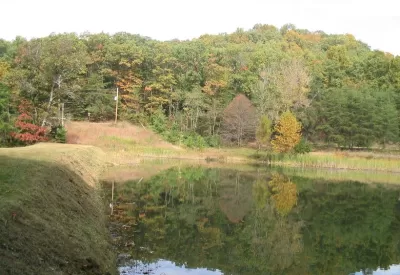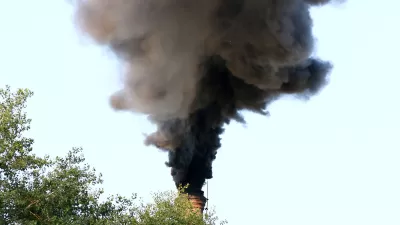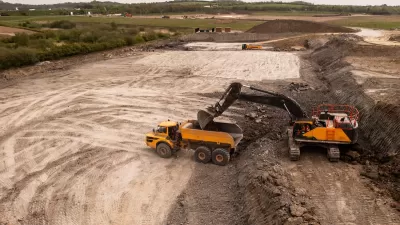A public forest is home to dozens of barrels that have been leaking toxic materials for decades.

Parks officials in Louisville, Kentucky are taking the first steps to clean up a hazardous waste site in a public park locally known as ‘Gully of the Drums,’ reports James Bruggers in Inside Climate News. The city released a plan to take soil samples and dig trenches to assess the condition of the site.
As Bruggers explains, “The site sits about 700 feet from the notorious ‘Valley of the Drums,’ where some 17,000 hazardous waste drums were discovered in the late 1970s on farmland 17 miles south of downtown Louisville, which were removed in one of the first major federal Superfund cleanups in the United States.”
While the Valley was cleaned up by the EPA, the Gully site remained contaminated with 40 to 45 barrels of toxic waste. “The new study, if approved by the Louisville Metro Council, will involve taking soil samples near the visible drums as well as digging trenches to see whether unseen barrels or containers of toxic waste were also buried, and then testing the soil to see if that area has hazardous waste.”
Lauren Heberle, a professor at the University of Louisville, says the plan could do more to address contaminants like PFAS that were not tested for before, and should also test groundwater and a nearby creek.
FULL STORY: Louisville, Kentucky, Moves Toward Cleaning Up Its ‘Gully of the Drums’ After More Than Four Decades

Planetizen Federal Action Tracker
A weekly monitor of how Trump’s orders and actions are impacting planners and planning in America.

Congressman Proposes Bill to Rename DC Metro “Trump Train”
The Make Autorail Great Again Act would withhold federal funding to the system until the Washington Metropolitan Area Transit Authority (WMATA), rebrands as the Washington Metropolitan Authority for Greater Access (WMAGA).

The Simple Legislative Tool Transforming Vacant Downtowns
In California, Michigan and Georgia, an easy win is bringing dollars — and delight — back to city centers.

Albuquerque’s Microtransit: A Planner’s Answer to Food Access Gaps
New microtransit vans in Albuquerque aim to close food access gaps by linking low-income areas to grocery stores, cutting travel times by 30 percent and offering planners a scalable model for equity-focused transit.

This City Will Pay You to Meet Your Neighbors
A North Kansas City grant program offers up to $400 for residents to throw neighborhood block parties.

Commentary: Our Silence Will Not Protect Us
Keeping our heads down and our language inoffensive is not the right response to the times we’re in. Solidarity and courage is.
Urban Design for Planners 1: Software Tools
This six-course series explores essential urban design concepts using open source software and equips planners with the tools they need to participate fully in the urban design process.
Planning for Universal Design
Learn the tools for implementing Universal Design in planning regulations.
Smith Gee Studio
City of Charlotte
City of Camden Redevelopment Agency
City of Astoria
Transportation Research & Education Center (TREC) at Portland State University
US High Speed Rail Association
City of Camden Redevelopment Agency
Municipality of Princeton (NJ)





























